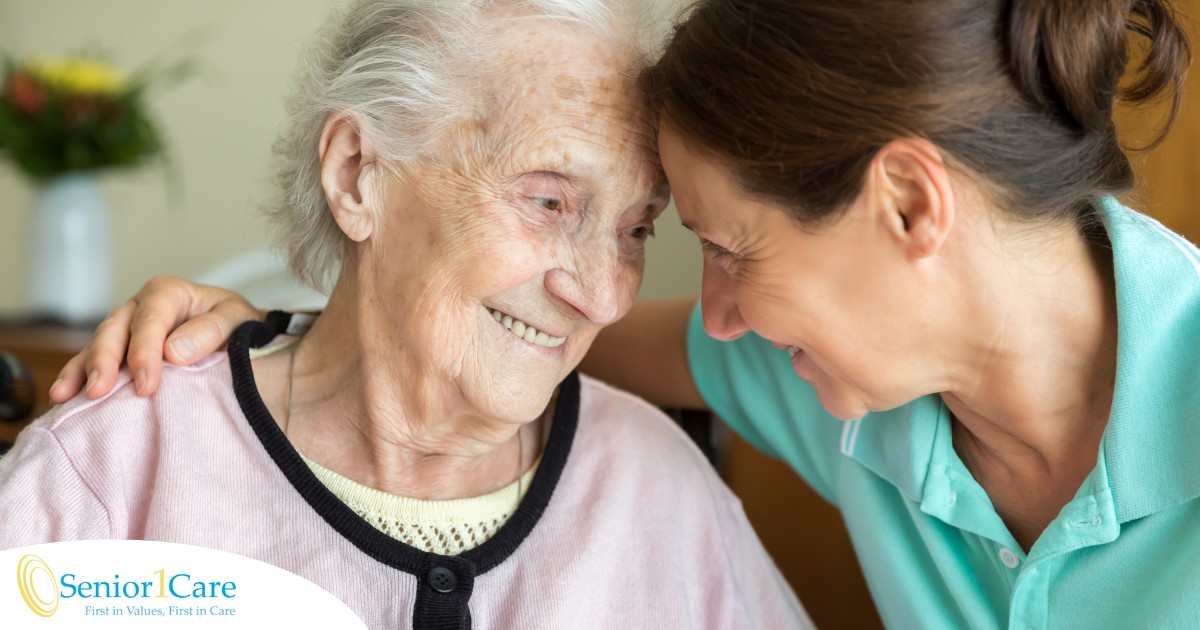Professional caregivers must often care for clients with Alzheimer’s and other forms of dementia. Some of those clients may exhibit unusual behaviors in the late afternoon or early evening – a phenomenon known as sundown syndrome, or simply “sundowning.” As an in-home caregiver, helping someone with dementia and sundown syndrome live out the remainder of their life with dignity takes special training. Using these sundowning care tips will help ensure your client stays safe and comfortable even on the most overcast days.
What Are the Most Common Signs of Sundowning?
According to the Alzheimer’s Association, up to 20% of all people with Alzheimer’s experience sundowning. When your client has Alzheimer’s or dementia, the approach of sunset can trigger one or more of these sudden behavioral, emotional, or cognitive changes:
- Anxiety
- Increased confusion
- Mood swings
- Energy bursts
- Restlessness
- Sadness
- Delusions or hallucinations
These changes may then cause challenging behaviors such as insomnia, crying, disorientation, pacing, rocking, anger, aggression, and resistance. Although they may not be able to explain why your client could feel the urgent need to do something or go somewhere.
What Factors Trigger Sundown Syndrome?
Even though sundown syndrome can occur at any stage of dementia, this phenomenon usually presents in the middle stages and then decreases as the disease progresses. There are many theories about why sundowning occurs, while triggers seem to vary among dementia patients.
For some clients, sundowning may be triggered by dimming light and a sensation that it’s time to “go home” or switch activities. Others may experience sundowning due to hunger, thirst, pain, fatigue, or hormonal changes that happen as the sun begins to set.
Sundowning Management Tips for Caregivers
Thankfully, there are many ways for you as a caregiver to help reduce and manage the effects of sundowning. These are some of the best:
Minimize triggers
Be mindful of triggers that bring on sundowning behaviors and try to avoid them. For instance, afternoon transitions and activities you consider normal can make your client anxious or confused.
Also, watch for nutritional triggers and adjust eating and drinking schedules accordingly. Caffeine, alcohol, and sugar can over-stimulate some clients while limiting liquids later in the day will minimize the urge to toilet for others.
Stick to a routine
Maximize physical activity earlier in the day while keeping naps to a minimum. Do your best to avoid challenging, stressful tasks around dusk and after dark. Because familiarity often means security for someone with sundowners, find a daily routine that works for your client and then stick to it.
Adjust light exposure
Some dementia researchers believe that too little light triggers sundowning by altering the body’s hormone levels and internal clock. As it gets dark outside, increase indoor lighting with bright bulbs or a lightbox. In the winter, when days get shorter, turn on bright outside lights near the windows.
Simplify the home’s surroundings
Too much noise or clutter can cause someone with sundowners to become anxious and confused. Go around the house and minimize visual, physical, and auditory clutter, notably in your client’s living room and bedroom. At night, keep their bedroom calm, comfortable, and dark, with dim nightlights for safe navigation.
During the day, play relaxing, all-instrumental music. If your client starts to get anxious or agitated in the late afternoon, try singing or playing their favorite songs. At bedtime, play soothing sounds such as rain, ocean waves, or white noise to help them fall asleep and sleep longer.
Validate and distract
Trying to reason with someone experiencing a sundowning episode usually doesn’t work. Instead, validate your client’s feelings (even if they make no sense) to assure them you are listening. Try to distract them from troubling thoughts and anxieties by redirecting their attention to favorite activities, foods, pets, or people.
Exciting Positions for Caregivers in Indianapolis, IN
If you live in the Indianapolis, IN, area, Senior1Care is now seeking qualified candidates to join our growing team. Senior1Care is a well-respected, professional, and fun company to work for – one that also operates with unequaled honesty and integrity. Our philosophy is to hire the very best caregivers in the market and then allow them to shine while providing our clients with an exceptional experience that exceeds their expectations.
As a local, family-owned, and operated agency, most of our caregivers are RNs, LPNs, HHAs, or CNAs to ensure the highest level of care for those we serve. If you live in the Indianapolis, IN, area and would like to learn more about working in the fast-paced home care industry, please visit Senior1Care by clicking here now!





